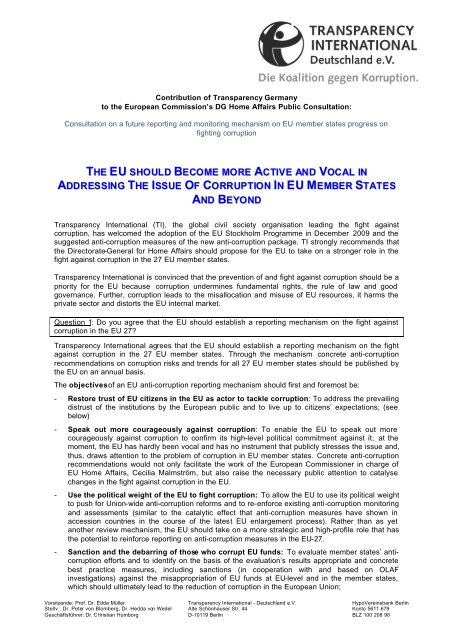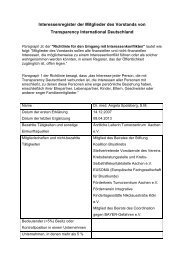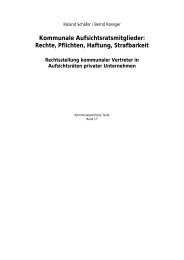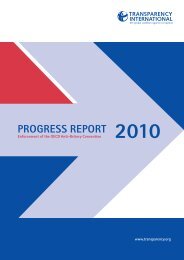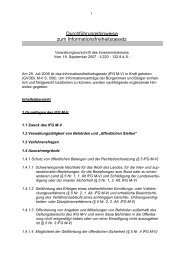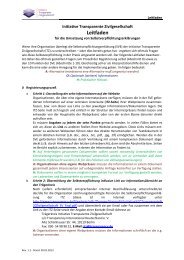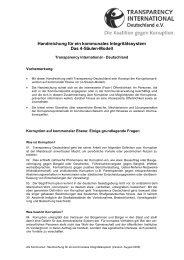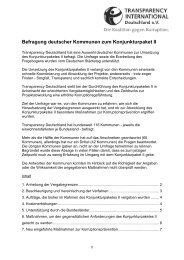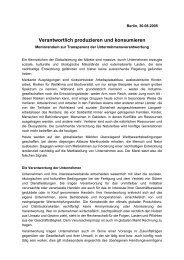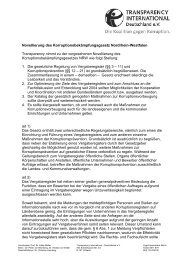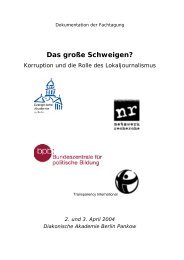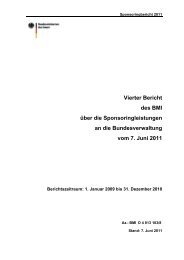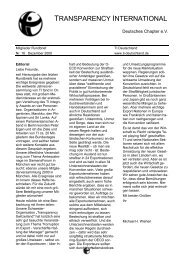Transparency International Germany - European Commission
Transparency International Germany - European Commission
Transparency International Germany - European Commission
You also want an ePaper? Increase the reach of your titles
YUMPU automatically turns print PDFs into web optimized ePapers that Google loves.
Contribution of <strong>Transparency</strong> <strong>Germany</strong><br />
to the <strong>European</strong> <strong>Commission</strong>’s DG Home Affairs Public Consultation:<br />
Consultation on a future reporting and monitoring mechanism on EU member states progress on<br />
fighting corruption<br />
THE EU SHOULD BECOME MORE ACTIVE AND VOCAL IN<br />
ADDRESSING THE ISSUE OF CORRUPTION IN EU MEMBER STATES<br />
Vorsitzende: Prof. Dr. Edda Müller<br />
Stellv.: Dr. Peter von Blomberg, Dr. Hedda von Wedel<br />
Geschäftsführer: Dr. Christian Humborg<br />
AND BEYOND<br />
<strong>Transparency</strong> <strong>International</strong> (TI), the global civil society organisation leading the fight against<br />
corruption, has welcomed the adoption of the EU Stockholm Programme in December 2009 and the<br />
suggested anti-corruption measures of the new anti-corruption package. TI strongly recommends that<br />
the Directorate-General for Home Affairs should propose for the EU to take on a stronger role in the<br />
fight against corruption in the 27 EU member states.<br />
<strong>Transparency</strong> <strong>International</strong> is convinced that the prevention of and fight against corruption should be a<br />
priority for the EU because corruption undermines fundamental rights, the rule of law and good<br />
governance. Further, corruption leads to the misallocation and misuse of EU resources, it harms the<br />
private sector and distorts the EU internal market.<br />
Question 1: Do you agree that the EU should establish a reporting mechanism on the fight against<br />
corruption in the EU 27?<br />
<strong>Transparency</strong> <strong>International</strong> agrees that the EU should establish a reporting mechanism on the fight<br />
against corruption in the 27 EU member states. Through the mechanism concrete anti-corruption<br />
recommendations on corruption risks and trends for all 27 EU member states should be published by<br />
the EU on an annual basis.<br />
The objectives of an EU anti-corruption reporting mechanism should first and foremost be:<br />
- Restore trust of EU citizens in the EU as actor to tackle corruption: To address the prevailing<br />
distrust of the institutions by the <strong>European</strong> public and to live up to citizens’ expectations; (see<br />
below)<br />
- Speak out more courageously against corruption: To enable the EU to speak out more<br />
courageously against corruption to confirm its high-level political commitment against it; at the<br />
moment, the EU has hardly been vocal and has no instrument that publicly stresses the issue and,<br />
thus, draws attention to the problem of corruption in EU member states. Concrete anti-corruption<br />
recommendations would not only facilitate the work of the <strong>European</strong> <strong>Commission</strong>er in charge of<br />
EU Home Affairs, Cecilia Malmström, but also raise the necessary public attention to catalyse<br />
changes in the fight against corruption in the EU.<br />
- Use the political weight of the EU to fight corruption: To allow the EU to use its political weight<br />
to push for Union-wide anti-corruption reforms and to re-enforce existing anti-corruption monitoring<br />
and assessments (similar to the catalytic effect that anti-corruption measures have shown in<br />
accession countries in the course of the latest EU enlargement process). Rather than as yet<br />
another review mechanism, the EU should take on a more strategic and high-profile role that has<br />
the potential to reinforce reporting on anti-corruption measures in the EU-27.<br />
- Sanction and the debarring of those who corrupt EU funds: To evaluate member states’ anticorruption<br />
efforts and to identify on the basis of the evaluation’s results appropriate and concrete<br />
best practice measures, including sanctions (in cooperation with and based on OLAF<br />
investigations) against the misappropriation of EU funds at EU-level and in the member states,<br />
which should ultimately lead to the reduction of corruption in the <strong>European</strong> Union;<br />
<strong>Transparency</strong> <strong>International</strong> - Deutschland e.V.<br />
Alte Schönhauser Str. 44<br />
D-10119 Berlin<br />
HypoVereinsbank Berlin<br />
Konto 5611 679<br />
BLZ 100 208 90
Vorsitzende: Prof. Dr. Edda Müller<br />
Stellv.: Dr. Peter von Blomberg, Dr. Hedda von Wedel<br />
Geschäftsführer: Dr. Christian Humborg<br />
– 2 –<br />
- Early-warning tool / anticipation of crisis: The EU should outline trends and address possible<br />
systemic weaknesses at an early stage. Developments such as those currently happening in<br />
Greece or Ireland are acknowledged to have a corruption dimension (as was the case, inter alia,<br />
for the crises in Bulgaria and Romania) that severely affect the entire Union. If the EU were to<br />
highlight corruption risks at an early stage, it would have great potential to be alert of such crises.<br />
Accordingly, a stronger role of the EU in the fight against corruption could help the EU to mitigate<br />
the potential risks to the Union produced by the deep-rooted, systemic problems that can evolve<br />
into a crisis. The early warning function of the regular anti-corruption reporting by the EC adds a<br />
new feature to the repertoire of existing anti-corruption tools, which has the potential to scale down<br />
the negative effect and, at the same time, prevent other EU member states from backsliding or<br />
stagnating on anti-corruption measures.<br />
- Mutual learning and exchange of best practice: Since EU member states have developed<br />
different approaches with regards to the implementation of anti-corruption tools, they do not<br />
engage in the same way in the fight against corruption. Some of the anti-corruption policies work<br />
better than others but member states hardly know about each other’s successes and failures.<br />
Hence, the reporting mechanism should also contain measures to strengthen mutual learning and<br />
exchange of best practice.<br />
In practical terms, the EU anti-corruption reporting mechanism should be managed by the <strong>European</strong><br />
<strong>Commission</strong> Directorate-General Home Affairs. The output of the reporting mechanism could include a<br />
brief 1 to 2 page country analysis and a limited number of recommendations for each of the 27 EU<br />
Member States. The recommendations for all 27 EU member states should be no longer than 70<br />
pages in total, including an accessibly written executive summary of 10 pages for the media. The<br />
sources should be listed in an annex.<br />
The reporting by the <strong>European</strong> <strong>Commission</strong> should be based on contributions from:<br />
- Inter-governmental organisations could contribute key findings of their comprehensive<br />
evaluation, compliance reports and peer reviews relevant for the 27 EU member states and based<br />
on international and regional anti-corruption instruments and conventions.<br />
- Civil society (non-governmental) could offer independent anti-corruption and integrity<br />
assessments, research and expertise for the EU-27.<br />
- 27 EU member states (national governments and other stakeholders) could provide limited<br />
and/or ad-hoc relevant anti-corruption-related information as one of several inputs.<br />
- When evaluating the reported information from EU member states, the EU could be supported by<br />
a network of independent anti-corruption experts (non-governmental) from different EU<br />
member states. To ensure the integrity of the expert representatives, a code of conduct could be<br />
developed with expert selection undertaken publicly and transparently (see, for example:<br />
<strong>Commission</strong> Decision of 17 October 2007 setting up the Group of Experts on Trafficking in Human<br />
Beings (2007/675/EC); Composition (PDF File 74 KB); Background of the Members of the Experts<br />
Group; Call for Proposals).<br />
It is essential to note that there are synergies and complementarities with other anti-corruption<br />
mechanisms. The EU anti-corruption reporting mechanism should neither duplicate any of the preexisting<br />
anti-corruption mechanisms operated by inter-governmental organisations such as GRECO,<br />
the OECD and UNODC, nor any of the tools used by various interested civil society organisations. On<br />
the contrary, a stronger role of the EU through the reporting mechanism would be designed to<br />
integrate and re-enforce the key anti-corruption results and recommendations of GRECO, the OECD<br />
and UNODC to highlight member states’ anti-corruption areas of concern. As such, the EU would<br />
become an actor aiming at highlighting the most important findings identified by different sources on a<br />
country-by-country basis.<br />
Question 3: Existing monitoring mechanisms are largely based on official sources. Do you think they<br />
should be complemented with contributions from civil society, academics and independent experts?<br />
It is essential for the quality of the EU reporting mechanism to be complemented with contributions<br />
from civil society, academics and independent experts. To ensure a balanced and representative<br />
reporting mechanism, the EU should be informed by different sources of information (not only<br />
governmental), including civil society.<br />
<strong>Transparency</strong> <strong>International</strong> - Deutschland e.V.<br />
Alte Schönhauser Str. 44<br />
D-10119 Berlin<br />
HypoVereinsbank Berlin<br />
Konto 5611 679<br />
BLZ 100 208 90
Vorsitzende: Prof. Dr. Edda Müller<br />
Stellv.: Dr. Peter von Blomberg, Dr. Hedda von Wedel<br />
Geschäftsführer: Dr. Christian Humborg<br />
– 3 –<br />
Civil society organisations hold an important position in monitoring and assessing government anticorruption<br />
activities, policy implementation (at all levels) and possible abuses of power, with a view to<br />
sustaining a culture of transparency and public participation within the <strong>European</strong> Union.<br />
Civil society organisations in EU member states have acquired vast expertise in many public areas<br />
related to the fight against corruption. If such a reporting mechanism was to be established, civil<br />
society would lend its general support to assess the implementation of the EU anti-corruption<br />
recommendations and work as professional anti-corruption watch-dogs in their respective countries.<br />
Question 2: Would you support other measures to be proposed at EU level?<br />
The proposed EU reporting evaluation mechanism should merely be seen as first step to fight and<br />
prevent corruption both within the EU and in its external action. At this stage, there is no common EU<br />
policy against corruption! There is no coherent set of policies for member states in the EU and<br />
external measures for third countries.<br />
TI strongly demands an urgently needed comprehensive EU-wide Anti-Corruption Strategy, which<br />
cuts across all relevant EU policy areas. This is justified since corruption is recognised as serious<br />
crime in the Lisbon Treaty (Art 83 TFEU). Apart from the effort to develop an anti-corruption package<br />
for EU member states (for both, the public as well as the private sector), the EU should continue to<br />
mainstream anti-corruption into for example its private sector policies (including the financial service<br />
reform), the climate change policy and its external action, since corruption is viewed as a major<br />
obstacle to achieving the EU development goals. In this context, corruption is a symptom of poor<br />
governance and of a lack of transparent, accountable management and control systems, especially<br />
the management of national resources (see 2006 Communication on “Governance in the <strong>European</strong><br />
consensus on Development).<br />
Moreover, the proven shortcomings in the transformation of international and regional anti-corruption<br />
legal instruments into domestic law should also be addressed by the EU. The bare minimum for EU<br />
anti-corruption action is, at least, a regular review of the implementation and, even more importantly,<br />
the enforcement of the existing EU anti-corruption instruments at member state level (e.g.<br />
Convention 1997, Council Framework Decision 2003 and the UNCAC which was not ratified by all EU<br />
member states).<br />
There is no need to re-invent the wheel and to loose precious time in the fight against corruption with<br />
the proposal to revert back to the debate on the definition of corruption. The EU is already State Party<br />
to the UNCAC since its ratification in November 2008 and is, thus, obliged to self-evaluate its<br />
anti-corruption policy, action and measures (UNCAC review mechanism). The UNCAC provides a<br />
concrete set of measures, which can be considered as entry points for the EU to prevent, criminalise<br />
and ultimately punish corruption and also raise awareness about the issue.<br />
To apply a holistic approach across the various policy areas and to implement a comprehensive EU<br />
anti-corruption strategy, the <strong>European</strong> <strong>Commission</strong> inter-service group on anti -corruption should<br />
be strengthened, following to which the results will consequently become of higher political<br />
importance. One of the mandates of the group could be to analyse and facilitate the mainstreaming of<br />
anti-corruption, transparency and integrity into the relevant EU policy areas, programmes and<br />
legislation.<br />
Civil society involvement is key in the implementation of anti-corruption action by government.<br />
Without a watchdog that monitors which promises are kept, only limited progress can be expected.<br />
Providing more financial means for awareness raising campaigns, the development of better anticorruption<br />
tools to gather data on corruption across and outside the EU or other anti-corruption<br />
projects would be desirable.<br />
Question 4: Which areas whether in public or private sector you consider as particularly vulnerable to<br />
corruption (e.g. politics, law enforcement, judiciary, health, education, public procurement including.<br />
spending of EU funds, business relations)<br />
Since March 2009, TI has recommended developing an assessment in three areas (i.e. public sector,<br />
private sector and judiciary) that are particularly vulnerable to corruption. Corruption risks and/ or lack<br />
of enforcement of existing anti-corruption laws and mechanisms in those areas are outlined below as<br />
a problem statement that is followed by relevant questions. The questions could form the basis of the<br />
<strong>Transparency</strong> <strong>International</strong> - Deutschland e.V.<br />
Alte Schönhauser Str. 44<br />
D-10119 Berlin<br />
HypoVereinsbank Berlin<br />
Konto 5611 679<br />
BLZ 100 208 90
Vorsitzende: Prof. Dr. Edda Müller<br />
Stellv.: Dr. Peter von Blomberg, Dr. Hedda von Wedel<br />
Geschäftsführer: Dr. Christian Humborg<br />
– 4 –<br />
short assessment and, where feasible, be supported by data. As such, the <strong>European</strong> <strong>Commission</strong><br />
could retain flexibility as to the areas evaluated.<br />
Public Sector<br />
1) Problem: conflict of interest (in particular revolving door between government /<br />
administration and private sector)<br />
Question: To what extent are there provisions in place to ensure the integrity of public sector<br />
employees? To what extent is the integrity of civil servants ensured in practice? Is there an<br />
effective income and asset disclosure regime for public office holders? Does regulation<br />
prohibit or restrain private employment for former civil servants? How rigorously is such<br />
regulation enforced?<br />
2) Problem: abuse of public funds, in particular EU funds<br />
Question: To what extent is there an effective legal framework in place to safeguard integrity<br />
in public procurement procedures, including meaningful sanctions for improper conduct by<br />
both suppliers and public officials, and independent review and complaint mechanisms? Are<br />
there assessments of the effectiveness of implementation?<br />
3) Problem: abuse of political party financing<br />
Question: Does the political finance oversight body effectively regulate candidate and political<br />
party finance? Does the EMB effectively oversee and administer free and fair elections and<br />
ensure the integrity of the electoral process? To what extent do the financial resources<br />
available to political parties allow for effective political competition?<br />
4) Problem: lack of whistle-blower protection in public (and also private sector)<br />
Private Sector<br />
Question: Do effective measures exist to protect witnesses, whistleblowers (in public and<br />
private sector) and victims of corruption from potential retaliation or intimidation?<br />
1) Problem: weak reporting of EU-listed companies<br />
What incentives / regulations do member states use to persuade companies to disclose anticorruption-relevant<br />
information and to promote integrity in the private sector? Do member<br />
states require EU-listed companies based in their country to report in detail on revenues made<br />
and payments made at the national level in every country of operation (in short, do they<br />
require country -by-country reporting for all listed companies?)? Do member states have<br />
investigative tools or specialised staff to analyse corporat e anti-corruption measures? Have<br />
member states published guidelines (such as the Global Compact or <strong>Transparency</strong><br />
<strong>International</strong> Business Principles for Countering Bribery) on corporate anti-corruption<br />
measures?<br />
2) Problem: acts of (foreign) bribery<br />
Does effective national legislation exist to provide meaningful sanctions in case of private<br />
sector bribery? Does legislation cover both personal and corporate liability? Are heads of<br />
business criminally liable? Is regulation enforced? If member states have illicit enrichment<br />
legislation, what actions are they taking in relevant cases?<br />
3) Problem: lack of corruption-related debarment<br />
Does the EU member state have in place a debarment system for companies that engage or<br />
have engaged in corrupt practices? Are those companies debarred from public tenders, and if<br />
so, for how long? Is this system articulated to the EU Central Exclusion Database and is the<br />
information available to other member states (cross-debarment)? Is it publicly available?<br />
4) Problem: corporate links with offshore centres<br />
Judiciary<br />
Does the member state require publication of the place of registration for all substantial<br />
subsidiaries of listed corporations? Does the member state forbid corporate relationships with<br />
non-cooperative offshore centres? Do member states provide sufficient cooperation with each<br />
other in the recovery of taxes and illegally acquired assets?<br />
1) Problem: insufficient cross-border police and judicial cooperation<br />
<strong>Transparency</strong> <strong>International</strong> - Deutschland e.V.<br />
Alte Schönhauser Str. 44<br />
D-10119 Berlin<br />
HypoVereinsbank Berlin<br />
Konto 5611 679<br />
BLZ 100 208 90
Vorsitzende: Prof. Dr. Edda Müller<br />
Stellv.: Dr. Peter von Blomberg, Dr. Hedda von Wedel<br />
Geschäftsführer: Dr. Christian Humborg<br />
– 5 –<br />
Do domestic judicial authorities cooperate in full and offer mutual legal assistance to<br />
requesting foreign judicial authorities? Do domestic judicial authorities offer sufficient<br />
cooperation both to requesting states and to various regional authorities engaged in criminal<br />
investigation and prosecution across borders (Europol, Eurojust, OLAF etc)? Is there sufficient<br />
national legislation for international cooperation to enable any potential <strong>European</strong> Public<br />
Prosecution Office (and the aforementioned regional authorities) to prosecute cross-border<br />
corruption-related cases?<br />
2) Problem: weak access to justice: insufficient initiation of investigations by police and<br />
public prosecution services<br />
Does access to information legislation exist to allow for the disclosure for documents related to<br />
corruption-related investigations, both in the pre-trial phase and the trial phase before a<br />
domestic court? How many of such investigations result in charges and enter the trial phase<br />
before a domestic court?<br />
3) Problem: inefficiency of court proceedings<br />
How many corruption-related cases are brought before domestic courts and found<br />
admissible? How many of those cases result in acquittals?<br />
4) Problem: impunity<br />
How many corruption-related court proceedings lead to successful prosecutions, i.e.<br />
convictions? How many cases result in a court verdict and/or in settlements? How many of<br />
those cases lead to a verdict, impose a fine and/or imprisonment as sanction? Are member<br />
states supported to seize and confiscate profits from criminal activities in order to ensure that<br />
crime does not pay?<br />
The different national legal situations must be considered in order to draw conclusions under 3<br />
and 4.<br />
Question 5: What incentives could be applied to offer the best chance for member states to implement<br />
recommendations contained in an EU reporting mechanism? (Examples: An anti-corruption fund for<br />
implementing certain measures (e.g. setting up or strengthening anti-corruption institutions, complaint<br />
mechanisms, providing training or conducting awareness raising campaigns)<br />
A range of incentives can be proposed:<br />
- Demonstrating political will and concrete action against corruption: the EU and national<br />
governments should speak out more courageously against corruption to confirm the high-level<br />
political commitment against corruption.<br />
- The EU should use positive incentives by "naming and faming" well performing member states<br />
and highlight good examples and best practices. At the same time, the EU should not shy away<br />
from naming issues and systemic weaknesses in other member states. A ranking of member<br />
states from best to worst could prove to be an incentive.<br />
- It is recommended that a mechanism for EU member states (and those countries which receive<br />
EU budget support) is developed, with which sanctions could be imposed on those member<br />
states and/or companies that misappropriated EU funds (similar to, for instance, the freezing of<br />
EU funds for Bulgaria). A debarment system for member states or companies which are found<br />
guilty of cases of corruption or fraud involving EU funds should be established.<br />
- An anti-corruption fund for implementing anti-corruption measures should be established. Through<br />
the fund awareness-raising and education campaigns against corruption should be supported<br />
at the EU level and in all EU member states.<br />
Additional Question: Why is there a need for the EU to take on a stronger role in the fight against<br />
corruption?<br />
Corruption acts as a serious distortion of competition within the internal <strong>European</strong> market. As<br />
stated goal of the <strong>European</strong> Union is to provide for a competitive <strong>European</strong> marketplace, the EU<br />
has an obligation to make private sector corruption a primary concern in all policies<br />
Corruption comes at a high cost for EU citizens.<br />
<strong>Transparency</strong> <strong>International</strong> - Deutschland e.V.<br />
Alte Schönhauser Str. 44<br />
D-10119 Berlin<br />
HypoVereinsbank Berlin<br />
Konto 5611 679<br />
BLZ 100 208 90
Vorsitzende: Prof. Dr. Edda Müller<br />
Stellv.: Dr. Peter von Blomberg, Dr. Hedda von Wedel<br />
Geschäftsführer: Dr. Christian Humborg<br />
– 6 –<br />
Last year, 13.5% of Greek households paid a bribe, 1,355 EUR on average, according to a<br />
<strong>Transparency</strong> <strong>International</strong> Greece survey published in April 2010. Petty corruption in Greece<br />
was estimated at 790 Mio. EUR in 2009. Ordinary citizens report handing out cash-filled<br />
envelopes to get driver's licenses, doctor's appointments, building permits, or to reduce their<br />
tax bills, according to <strong>Transparency</strong> <strong>International</strong> Greece.<br />
Total public procurement in the EU – i.e. the purchases of goods, services and public works<br />
by governments and public utilities - is estimated at about 16% of the Union’s GDP (EC<br />
figure). Corruption is estimated to comprise between 10% and 25% of contract value (TI<br />
Handbook on Public Procurement).<br />
Corruption is an obstacle in the effective exercise of Union citizenship and Fundamental<br />
rights. Corruption is widening the gap between the applicable legal rules in EU member states<br />
and the practical reality citizens are faced with in their daily life, in particular in cross-border<br />
situations. Poorer citizens in particular feel the brunt of corruption and are often denied the rights<br />
which they are entitled to, particularly those related to basic public services delivery. The<br />
prevention of and fight against corruption should be a priority for the EU because corruption<br />
deprives EU citizens of stable and functioning systems that are based on fundamental rights, the<br />
rule of law and good governance. Anti-corruption measures will give confidence to EU citizens that<br />
their individual rights under EU rules will be upheld.<br />
Citizens expect the EU to lend its political weight to the fight against corruption. EU citizens<br />
are seriously concerned by corruption. A significant majority is of the opinion that the EU<br />
institutions and member states are ill-equipped to prevent corruption. Accordingly, there is an<br />
increasing demand to strengthen the role of the EU. The EU should raise public attention to the<br />
issue of corruption and catalyse change to restore trust, integrity and accountability vis-à-vis the<br />
Union as anti-corruption actor, its member states and the public at large.<br />
TI's Global Corruption Barometer 2009 - the survey exploring the view of the general public<br />
on corruption in 69 countries (18 of which are EU member states) indicates that within the<br />
surveyed EU member states more than half of the respondents (54 per cent) report private<br />
sector bribery to be a common phenomenon. Read more.<br />
2008 <strong>European</strong> <strong>Commission</strong>'s public consultation on the question "Freedom, Security and<br />
Justice: What will be the future?" shows that the fight against corruption is a top priority. A<br />
total of 88% of the respondents affirmed that the EU should do more about corruption. Read<br />
more.<br />
Eurobarometer survey 2009 (<strong>European</strong> <strong>Commission</strong>) on the attitudes of <strong>European</strong>s towards<br />
corruption reveals that <strong>European</strong> public opinion has shifted to an even more negative<br />
perception compared to the last Eurobarometer survey of 2008, with a higher level of<br />
respondents (78%) answering that corruption is a major problem in their country. Download<br />
here.<br />
Eurobarometer survey 2008 (<strong>European</strong> <strong>Commission</strong>) on the attitudes of <strong>European</strong>s towards<br />
corruption (released on 30 October 2008), demonstrates that, overall, corruption in EU<br />
member states is seen as widespread issue, with 3 out of 4 citizens regarding corruption as a<br />
major problem in their country. Download here.<br />
About <strong>Transparency</strong> <strong>International</strong><br />
<strong>Transparency</strong> <strong>International</strong> (TI) is the global civil society organisation (non-governmental organisation)<br />
leading the fight against corruption. Through more than 95 chapters worldwide (i.e. in almost every EU<br />
member state and accession candidate and potential candidate country) and an international<br />
secretariat in Berlin, <strong>Germany</strong>, TI raises awareness of the damaging effects of corruption and works<br />
with partners in government, business and civil society to develop and implement effective measures<br />
to tackle it. One of <strong>Transparency</strong> <strong>International</strong>’s main areas of expertise and experience is<br />
transparency in public contracting and public finance management.<br />
Reference Documents:<br />
- Stockholm Programme [488 KB]<br />
- Stockholm Action Plan<br />
<strong>Transparency</strong> <strong>International</strong> - Deutschland e.V.<br />
Alte Schönhauser Str. 44<br />
D-10119 Berlin<br />
HypoVereinsbank Berlin<br />
Konto 5611 679<br />
BLZ 100 208 90
Vorsitzende: Prof. Dr. Edda Müller<br />
Stellv.: Dr. Peter von Blomberg, Dr. Hedda von Wedel<br />
Geschäftsführer: Dr. Christian Humborg<br />
– 7 –<br />
- Communication from the <strong>Commission</strong> to the Council, the <strong>European</strong> Parliament and the <strong>European</strong><br />
Economic and Social Committee - On a comprehensive EU policy against corruption COM(2003)<br />
317 final<br />
Berlin, 03.12.2010<br />
<strong>Transparency</strong> <strong>International</strong> - Deutschland e.V.<br />
Alte Schönhauser Str. 44<br />
D-10119 Berlin<br />
HypoVereinsbank Berlin<br />
Konto 5611 679<br />
BLZ 100 208 90
Vorsitzende: Prof. Dr. Edda Müller<br />
Stellv.: Dr. Peter von Blomberg, Dr. Hedda von Wedel<br />
Geschäftsführer: Dr. Christian Humborg<br />
– 8 –<br />
<strong>Transparency</strong> <strong>International</strong> - Deutschland e.V.<br />
Alte Schönhauser Str. 44<br />
D-10119 Berlin<br />
HypoVereinsbank Berlin<br />
Konto 5611 679<br />
BLZ 100 208 90
Vorsitzende: Prof. Dr. Edda Müller<br />
Stellv.: Dr. Peter von Blomberg, Dr. Hedda von Wedel<br />
Geschäftsführer: Dr. Christian Humborg<br />
– 9 –<br />
<strong>Transparency</strong> <strong>International</strong> - Deutschland e.V.<br />
Alte Schönhauser Str. 44<br />
D-10119 Berlin<br />
HypoVereinsbank Berlin<br />
Konto 5611 679<br />
BLZ 100 208 90


